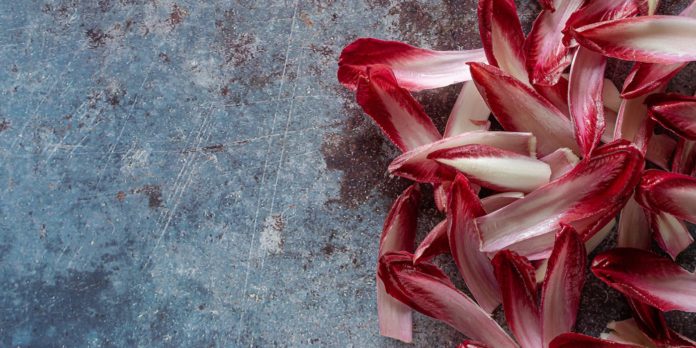Overview of Endive
Endive is “a plant grown for its crisp, curled leaves that is used in salads,” as stated by Dictionary.com, which provides the official meaning of the word “endive.”
To put it more succinctly, an endive plant is a leafy vegetable member of the chicory root family and contains several distinct types.
This form of leafy green is known by a variety of names. In Spanish, for instance, it is frequently referred to as chicory, Endive, or Endivias. There are a few distinct varieties of endives, including Cichorium endivia, Cichorium intybus, and Cichorium pumilum.
Types of Endive
There are three primary varieties of this vegetable available, and each one has a flavor and consistency that are just a little bit different from the others. The following varieties of Endive are some of the most popular and may be found in most grocery stores:
- Curly Endive (Cichorium endivia var. Crispum): In addition to having an unpleasant taste, the leaves of this particular kind of Endive, also referred to as frisée and chicory, are frilly and curly.
- Belgian Endive (Cichorium intybus var. Foliosum Endive): This variety of endive lettuce, also widely referred to as Belgium endive, has leaves that are the color of pale yellow and have a moderate amount of bitterness. A specific kind of Endive known as radicchio, often known as red Endive, has a more reddish coloration.
- Broad-leafed Endive, also known as Cichorium endivia var. latifolium is the least bitter of the three kinds of Endive. Although it comes from the same genus and species as curly Endive, broad-leafed Endive has a more delicate flavor. In certain recipes and meals, it’s often known as escarole vs. Endive.
It is important to recall that the enunciation of Endive might vary depending on the particular variety. The curly variety, for instance, is pronounced “in-dive,” and the Belgian type, on the other hand, is pronounced “Ahn-deev.”
Health Benefits of Endive
Aids In Digestion
This vegetable is an incredible source of fiber, providing about one gram of fiber in every serving size of half a cup. Suppose you want to maintain good digestive health and a regular bowel movement pattern. In that case, it is extremely necessary to consume an adequate amount of fiber in your diet.
This is because fiber travels through the digestive tract at a more leisurely pace, helping move food and other items along and keep things operating smoothly. According to research, fiber may help shield against a variety of digestive problems, including diverticulitis, diverticulitis, and hemorrhoids.
Persists Over Anorexia
Anorexia is one of the psychiatric diseases in which the individual suffering from it will always feel that they are overweight and, as a result, will either let themselves starve to death or refuse to eat at all.
Anorexic patients will eventually achieve a body mass index far lower than normal and be regarded as very thin. If you drink Endive daily, its health advantages will prevent the development of psychiatric illnesses like this one and stimulate your appetite.
Prevents Gallstone Disease
The gallbladder disease can develop when there is an abnormally high concentration of calcium in the body, particularly in the gallbladder. The condition that causes gallstones can also be brought on by excessive cholesterol levels.
Drinking water that has been boiled or eating fresh veggies made from endive leaves daily are both effective treatments for this ailment.
Contributes to a Clear Vision
Endive contains substantial amounts of vitamin A and beta-carotene (a precursor to vitamin A). Vitamin A helps maintain good eye health in several different ways, including warding against macular degeneration and improving night vision.
Although it is commonly thought that orange-colored vegetables are the best providers of vitamin A, leafy greens such as Endive are also excellent sources.
Endive, which contains vitamin A, is beneficial for the operation of the immune system and the proliferation of cells and provides support for the heart, lungs, kidneys, and other organs.
Improves the Condition of the Bones
Endive contains approximately 72 percent of your daily requirements for vitamin K, an essential fat-soluble vitamin. Vitamin K is critically important to the maintenance of healthy bones as well as the metabolism of bones. Endive is a rich source of vitamin A as well.
Additionally, it raises levels of a certain protein that contributes to a rise in calcium levels in your bones, boosting bone density and strength.
According to the findings of a number of studies, increasing the amount of vitamin K that you consume on a regular basis may help lower the risk of bone fractures and bone loss.
For instance, research conducted in Toronto found that giving postmenopausal women who had osteopenia (a condition characterized by a weakening of the bones) a daily supplement of five grams of vitamin K for a duration of two to four years reduced the risk of fractures in those patients.
According to the findings of another study that was published in the American Journal of Clinical Nutrition, a low intake of vitamin K was associated with a poorer bone mineral density in women.
Reduces Risk of Oral Cancer
Endive has been shown to reduce the risk of developing oral cancer, making it a valuable addition to any diet. If you heat an extract that has been prepared from endive leaves and drink it, you can stop the proliferation of cancer cells that attack the mouth cavity.
At least once every day to reduce the risk of developing this illness.
Improves the Look of the Skin
One of the many benefits of endive leaves is that they may be utilized in medicinal applications, including those that lighten and brighten the skin. You may use it to make a Lulur or a mask, or you can drink it as a regular beverage.
The skin of your body, as well as your face’s skin, will seem more brilliant and sparkling white as a result of the leaves’ content, which includes things like vitamin C and collagen.
It is also exceptionally easy to use; you simply mash the leaves of Endive until they are soft, and then you can blend them with other natural products like avocado, Bengkoang, and others.
The method of usage is really straightforward. After that, use it as a scrub before you wash your face or apply a face mask.
Maintains Healthy Liver Function
Even though there is a paucity of studies on people, there have been several studies conducted on animal models that have revealed that this leafy green can help maintain and sustain the function of the liver.
For instance, a study that was conducted on animals in Egypt in 2016 found that endive extract prevented many signs of liver damage that were caused by drug use in rats.
In the same light, further research that was published in the World Journal of Gastroenterology found that the extract reduced the accumulation of scar tissue in the livers of rats.
Helpful for Lose Weight
Hunger is the most difficult obstacle to overcome while reducing body fat. Endive has a low-calorie count but a high fiber content, which is an ideal combination for increasing satiety and aiding in the process of weight reduction. Fiber also delays digestion, keeping blood sugar and energy levels balanced.
Due to the high fiber content and water in the Endive, one may consume a greater quantity of food without taking in an excessive number of calories. A straightforward adjustment that can facilitate weight loss is to put more emphasis on eating more fiber-rich meals like Endive and other plant foods.
Smooth Urination
Is it difficult for you to urinate? Or are you not getting enough to drink when you are stuck at the office all day? Or maybe you are dehydrated? Consuming the leaves of the Endive might help you get rid of such problems.
Because the endive leaves contain a substance that causes urination, Endive is considered a diuretic. You should drink extracts from these leaves on a daily basis if you have issues, such as not having smooth urination since there is difficulty in peeing, as this will help.
Allergies
Allergies to leafy greens like Endive are less prevalent but potentially possible. This allergy is occasionally related to allergies to carrots, peaches, cherries, sycamore pollen, mugwort, and ragweed.
If you suffer from symptoms such as tightness in the chest, hives, a weak pulse, or edema after consuming Endive, see an allergist about your concerns.
Adverse Effects of Endive
Endive, like many other leafy greens, is an excellent source of vitamin K. Vitamin K promotes the coagulation of blood, making it more effective in stopping excessive bleeding after an injury.
On the other hand, if you take blood thinners like Coumadin (warfarin), this vitamin may prevent the drug from working as well as prevent blood clots from forming.




